新概念英语第二册语法课件不定式(共34张PPT)
文档属性
| 名称 | 新概念英语第二册语法课件不定式(共34张PPT) |
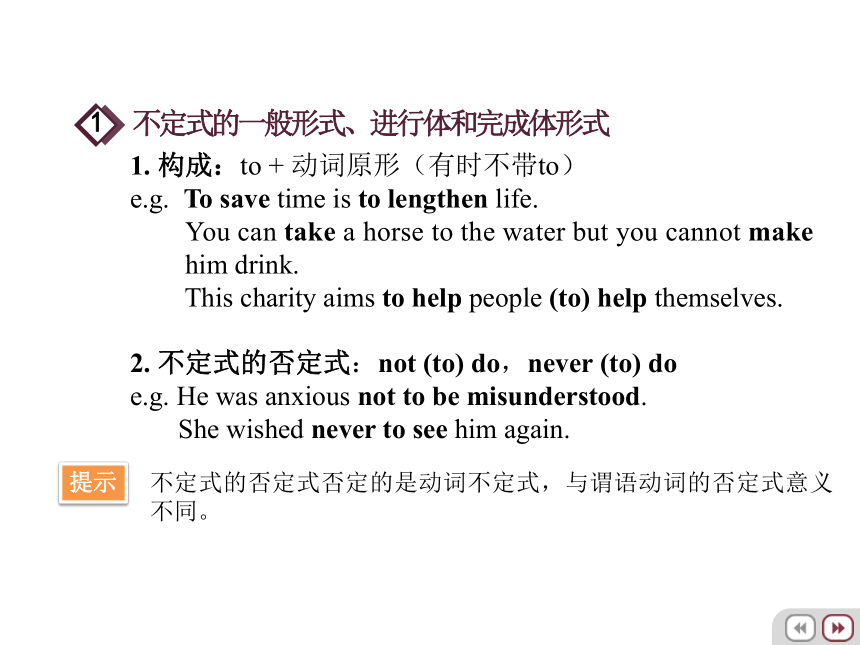
|
|
| 格式 | pptx | ||
| 文件大小 | 847.8KB | ||
| 资源类型 | 教案 | ||
| 版本资源 | 新概念英语 | ||
| 科目 | 英语 | ||
| 更新时间 | 2024-11-25 00:00:00 | ||
图片预览


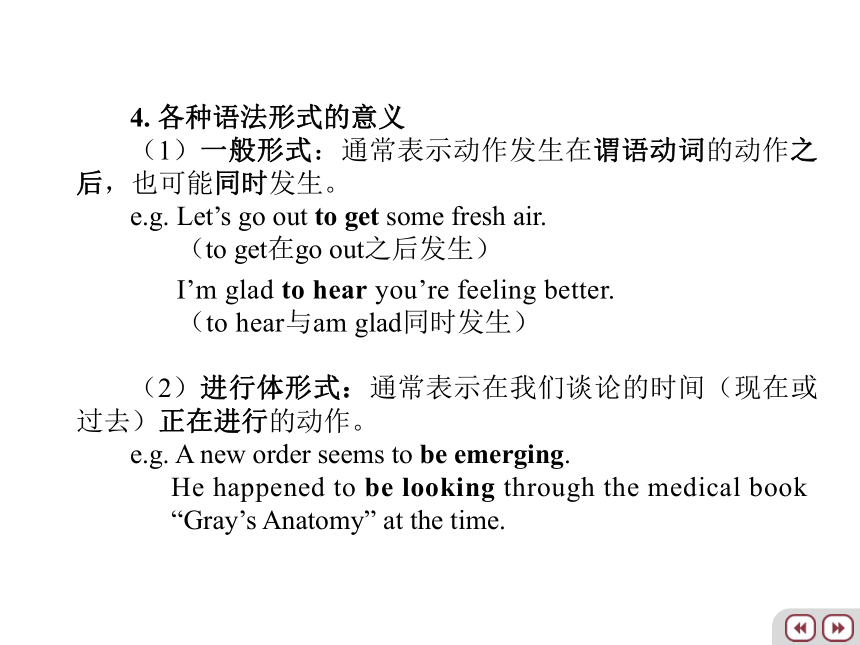

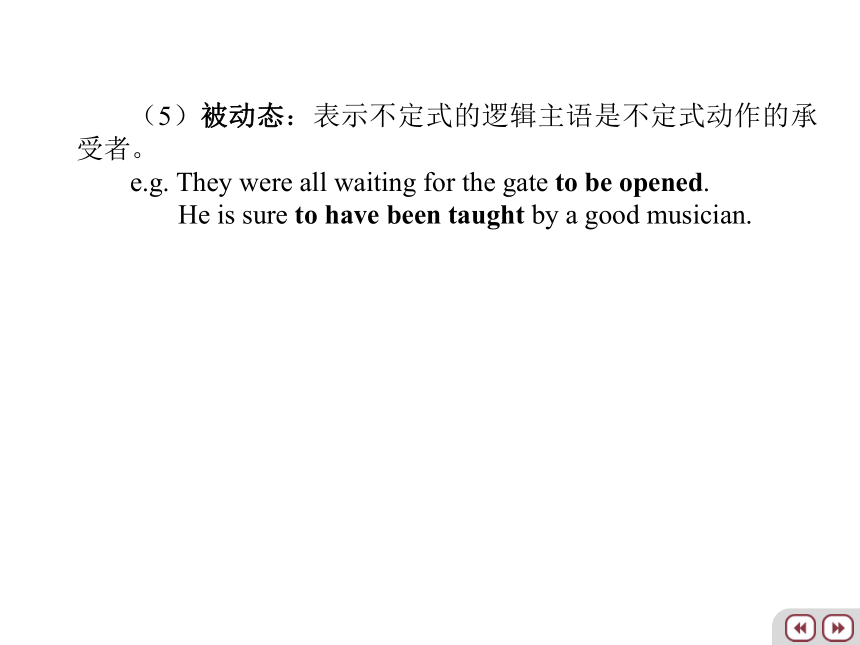
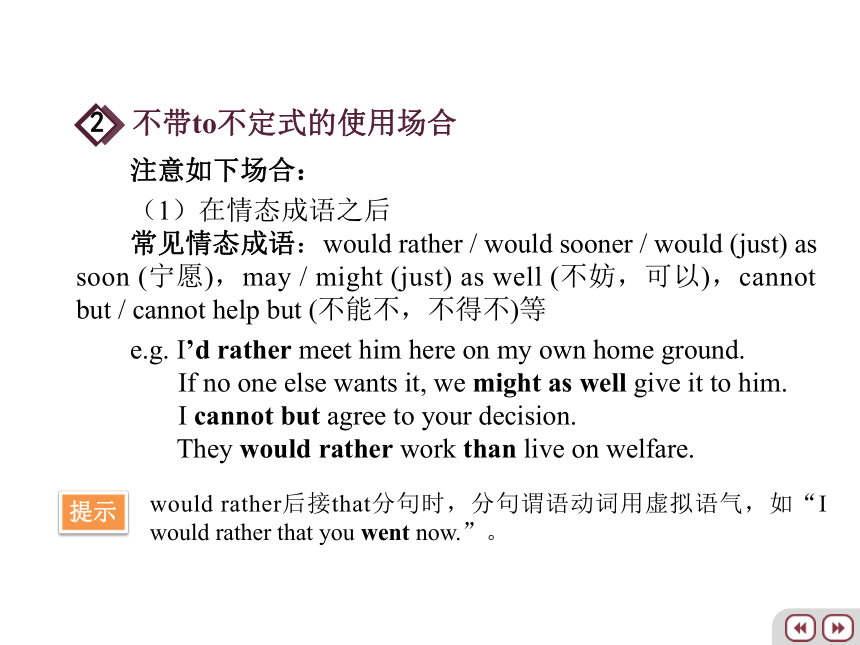
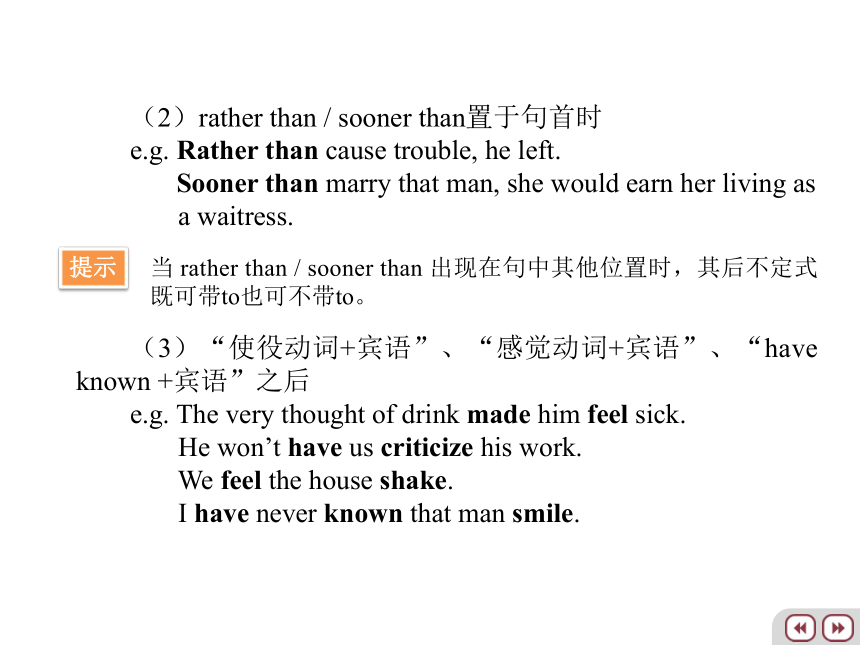
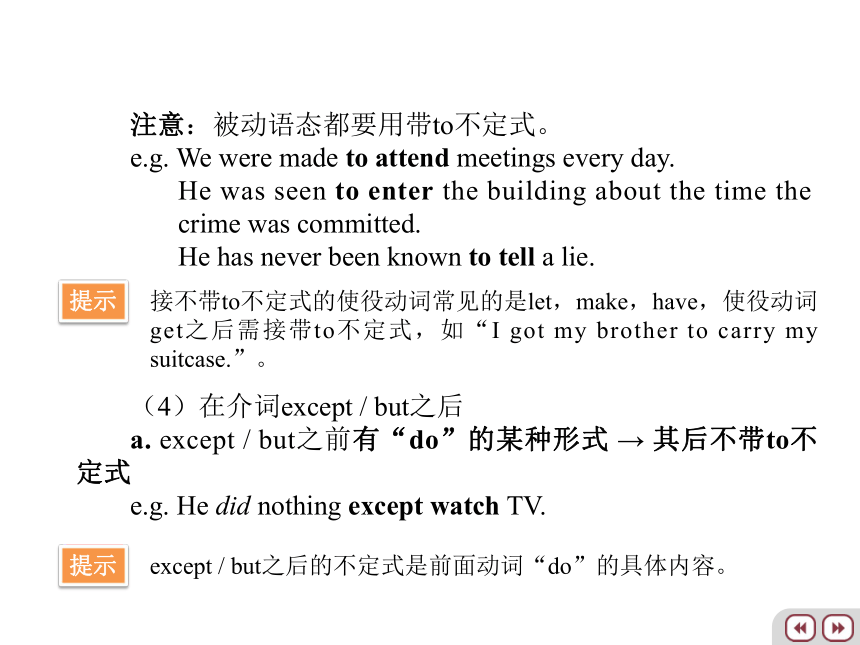

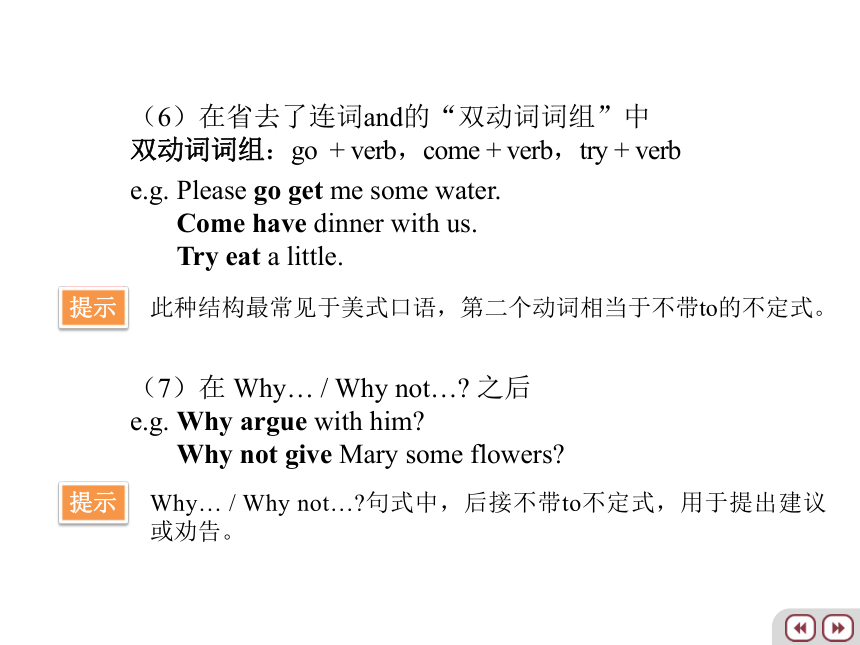


文档简介
(共34张PPT)
1. 构成:to + 动词原形(有时不带to)
e.g. To save time is to lengthen life.
You can take a horse to the water but you cannot make
him drink.
This charity aims to help people (to) help themselves.
2. 不定式的否定式:not (to) do,never (to) do
e.g. He was anxious not to be misunderstood.
She wished never to see him again.
不定式的一般形式、进行体和完成体形式
1
不定式的否定式否定的是动词不定式,与谓语动词的否定式意义不同。
提示
3. 六种语法形式
不定式没有“时”的标记,也不受“人称”和“数”的制约,但有“体”和“态”的区分。
提示
不定式 主动态 被动态
一般形式 (to) do (to) be done
进行体形式 (to) be doing /
完成体形式 (to) have done (to) have been done
完成进行体形式 (to) have been doing /
4. 各种语法形式的意义
(1)一般形式:通常表示动作发生在谓语动词的动作之后,也可能同时发生。
e.g. Let’s go out to get some fresh air.
(to get在go out之后发生)
I’m glad to hear you’re feeling better.
(to hear与am glad同时发生)
(2)进行体形式:通常表示在我们谈论的时间(现在或过去)正在进行的动作。
e.g. A new order seems to be emerging.
He happened to be looking through the medical book
“Gray’s Anatomy” at the time.
(3)完成体形式:通常表示动作发生在谓语动词表示的动作之前。
e.g. I’m sorry to have kept you waiting.
(to have kept在am sorry之前发生)
He is said to have left Shanghai.
(to have left在is said之前发生)
(4)完成进行体形式:表示动作发生在谓语动词的动作之前,并强调动作的连续性。
e.g. She is said to have been writing the novel for years.
The president was reported to have been flying across
the Atlantic.
不定式的完成体还常用于谈论“想象中”的过去未曾发生的动作,如“She was to have left earlier, but it rained.”。
提示
(5)被动态:表示不定式的逻辑主语是不定式动作的承受者。
e.g. They were all waiting for the gate to be opened.
He is sure to have been taught by a good musician.
注意如下场合:
(1)在情态成语之后
常见情态成语:would rather / would sooner / would (just) as soon (宁愿),may / might (just) as well (不妨,可以),cannot but / cannot help but (不能不,不得不)等
e.g. I’d rather meet him here on my own home ground.
If no one else wants it, we might as well give it to him.
I cannot but agree to your decision.
They would rather work than live on welfare.
不带to不定式的使用场合
2
would rather后接that分句时,分句谓语动词用虚拟语气,如“I would rather that you went now.”。
提示
(2)rather than / sooner than置于句首时
e.g. Rather than cause trouble, he left.
Sooner than marry that man, she would earn her living as
a waitress.
(3)“使役动词+宾语”、“感觉动词+宾语”、“have known +宾语”之后
e.g. The very thought of drink made him feel sick.
He won’t have us criticize his work.
We feel the house shake.
I have never known that man smile.
当 rather than / sooner than 出现在句中其他位置时,其后不定式既可带to也可不带to。
提示
注意:被动语态都要用带to不定式。
e.g. We were made to attend meetings every day.
He was seen to enter the building about the time the
crime was committed.
He has never been known to tell a lie.
(4)在介词except / but之后
a. except / but之前有“do”的某种形式 → 其后不带to不定式
e.g. He did nothing except watch TV.
接不带to不定式的使役动词常见的是let,make,have,使役动词get之后需接带to不定式,如“I got my brother to carry my suitcase.”。
提示
except / but之后的不定式是前面动词“do”的具体内容。
提示
b. except / but之前无“do”的某种形式 → 其后带to不定式
e.g. We have no choice but to turn back.
c. SVC句型中,主语部分有“do”的某种形式
→其后补语:带to不定式 / 不带to不定式
e.g. What he will do is (to) spoil the whole thing.
All you need to do is (to) complete this form.
(5)“主动词+主动词”固定搭配的第一主动词后
常见搭配:make believe,make do (with / on), let drop / let fall,let fly (at), let slip,let go (of) / leave go of,hear tell (of),(let...) go hang等
e.g. The children made believe they were doctors.
(made believe = pretended)
Don’t let slip such a golden opportunity. (let slip = miss)
主语部分通常是名词性分句或带有后置修饰语的名词词组。
提示
(6)在省去了连词and的“双动词词组”中
双动词词组:go + verb,come + verb,try + verb
e.g. Please go get me some water.
Come have dinner with us.
Try eat a little.
(7)在 Why… / Why not… 之后
e.g. Why argue with him
Why not give Mary some flowers
此种结构最常见于美式口语,第二个动词相当于不带to的不定式。
提示
Why… / Why not… 句式中,后接不带to不定式,用于提出建议或劝告。
提示
①* Did you see anybody to go out
②* Why not to take a holiday for a few days
③* She could do nothing but to wait here.
①√ Did you see anybody go out
②√ Why not take a holiday for a few days
③√ She could do nothing but wait here.
典型错误
3
备注
辨别的基本方法
介词to:之后能跟名词或代词,如跟动词,用-ing分词形式
不定式符号to:不能跟名词或代词,只能跟动词原形
e.g. You’ll soon get used to the climate here.
(get used to后接名词,to是介词)
You quickly get used to using the brakes.
(get used to之后用-ing分词,to 是介词)
We want to build a better life.
(want to后不能接名词,to是不定式符号)
通常可在to后面用一个名词或代词来尝试,如果意义完整,to就是介词,否则就是不定式。
提示
含有介词to的常见搭配
常见搭配:add to, agree to, adhere to, admit to, allude to, amount to, attend to, attest to, bow to, cling to, come to, correspond to, confess to, consent to, contribute to, object to, get to, pertain to, react to, resort to, revert to, refer to, relate to, submit to, succeed to, stick to, swear to, take to, trust to, witness to, yield to等
e.g. He admitted to having taken the money.
I’m a real coward when it comes to going to the dentist.
Ann’s father would not consent to her marrying a foreigner.
Mary took to being out frequently in the evening.
动词 + 介词to
1
可利用近义词、反义词来助记,如含有“坚持;坚守”之意的搭配有“adhere to,cling to,stick to”;含有“承认;供认;同意;应允”之意的搭配有“admit to,confess to,agree to,consent to”,其反义词“object to”。
提示
注意:agree,come,get,swear接不定式与接-ing分词的区别
e.g. [A1] She agreed to rent the room to me.
(“(听从了别人而)同意要出租”)
[A2] Mary’s father has agreed to her marrying John.
(“同意她嫁人的做法”)
[B1] He came to realize that he was mistaken.
(“终于明白”)
[B2] When it comes to getting things done, he’s useless.
(“涉及到”)
[C1] When you get to know him, you’ll like him.
(“达到认识阶段”)
[C2] Lying in bed, unable to sleep, I got to thinking how
nice it would be to go away and start a new life somewhere
else. (“开始思考”)
[D1] The witness swore to tell the truth.
(“发誓会讲实话”)
[D2] He swore to having seen the man do it.
(“肯定地说见过”)
备注
常见搭配:ascribe…to, apply…to, attribute…to, abbreviate…to, accustom…to, confine…to, commit…to, devote…to, dedicate…to, owe…to, prefer…to, reconcile…to, reduce…to, resign…to等
e.g. He attributes his success to working hard.
The doctor devoted himself to finding a cure.
动词 + 名词/代词 + 介词to
2
可利用近义词来助记,如含有“归因于”之意的搭配有“ascribe…to,attribute…to,owe…to”;含有“致力于”之意的搭配有“apply…to,devote…to”。
提示
常见搭配:be accustomed to, be reconciled to, be abbreviated to, be devoted to, be reduced to, be given to, be resigned to, be used to等
e.g. I was accustomed to being the only child at a table full of
adults.
He was reduced to begging for a living.
动词 + -ed分词 + 介词to
3
可利用词族来助记,如由reduce ... to可以记住be reduced to;由devote ... to记住be devoted to。
提示
常见搭配:get round to, get down to, get near to, face up to, feel up to, look forward to等
e.g. After a long delay, he got round to writing the letter.
I’m so tired I don’t feel up to going shopping today.
动词 + 副词小品词 + 介词to
4
常见搭配:adjacent to, adverse to, deaf to, equal to, loyal to, preferable to, similar to, superior to, sensitive to, tantamount to等
e.g. We must bear in mind that wasting time is equal to wasting
your life.
Whatever you may say, she is deaf to reasoning.
形容词 + 介词to
5
可利用近义词来助记,如含有“相当于;类似于”之意的搭配有“equal to,tantamount to,similar to”;“adverse to (厌恶),deaf to (不愿听)”可以一起记忆。
提示
常见搭配:obstacle to, limit to, aid to, objection to, indifference to, key to, answer to, hindrance to等
e.g. A lack of qualifications can be a major obstacle to finding
a job.
Scientists provided the key to understanding the genetic
code that determines every bodily feature.
名词 + 介词to
6
可利用近义词、反义词来助记,如含有“阻碍”之意的搭配有“obstacle to,hindrance to”,其反义词又是“aid to”;含有“回答”之意的搭配有“answer to,key to”。
提示
常见搭配:according to, prior to, as to, thanks to, owing to, in addition to, preliminary to, preparatory to, previous to, in relation to, with a view to, with an eye to 等
e.g. He lit his cigar previous to leaving the house.
He bought the old house with an eye to making it a hotel.
以介词to结尾的复杂介词
7
可利用近义词来助记,如含有“在…以前”之意的复杂介词有“preliminary to,previous to,prior to”;含有“由于”之意的复杂介词有“owing to,thanks to”;含有“为…目的;意在”之意的复杂介词有“with a view to,with an eye to”。
提示
The meeting was put off because we ______ a meeting without John.
A.
B.
C.
D.
objected having
were objected to having
objected to have
objected to having
该题考查不定式符号to与介词to的辨别问题。句中object用作不及物动词,其后需接介词to,object to意为“反对”,介词to之后应该用-ing分词而非不定式,因此D为正确答案。B为被动语态,与句意不符。
会议推迟了,因为我们反对在约翰缺席的情况下召开会议。
________ him tomorrow
A.
B.
C.
D.
Why not to call on
Why don’t call on
Why not calling on
Why not call on
该题考查“why not… ”句式。why not…之后总是接不带to不定式,不能接-ing分词。Why not … = Why don’t you… ,因此D为正确答案。
何不明天去拜访他?
He prefers __________.
A.
B.
C.
D.
to write his letters rather than dictating them
to write his letters rather than dictate them
writing his letters rather than dictate them
writing his letters rather than have dictated them
该题考查动词prefer to do … rather than do结构。动词prefer既可接不定式作宾语也可接-ing分词作宾语,prefer之后用to do还是doing取决于如下搭配:prefer to do sth. (rather than do sth.),prefer doing sth. to doing sth.,意思都是“宁愿做…而不做…”,根据句子结构,B为正确答案。
他喜欢自己写信,不愿意口授信稿。
The compositions contained so few errors that the teacher got the students ______ one another’s papers.
A.
B.
C.
D.
correct
to correct
correcting
to be correcting
该题考查使役动词get的用法。使役动词get不同于其它的使役动词,其后需接带to不定式的一般形式,因此B为正确答案。
这些作文中只包含少量错误,因此老师让同学们相互批改。
本讲开始涉及动词的非限定形式,本讲主要介绍了动词不定式的结构形式以及不定式符号的使用问题。学习中首先要了解不定式没有“时”的标记,也不受主语“人称”和“数”的制约,但有“体”和“态”的形态变化,在此基础上熟练掌握不定式的6种语法形式及其意义,特别是进行体、完成体和被动态形式。不带to不定式的12种常见使用场合是学习的重点:“使役动词 + 宾语”、“感觉动词 + 宾语”、“have known +宾语”不妨视作一类,但在被动态时,都要转为带to不定式;记忆一些情态成语、“主动词 + 主动词”固定搭配、why / why not … 句式,区分except / but之后的两种情况。不定式符号的单独使用是为了避免重复,常出现在非正式语体的并列结构、比较结构等结构中;并列的两个不定
式中第二个不定式符号为了避免重复也常可省略。不定式符号to与介词to的辨别问题是一大难点,可以首先理解介词to之后能跟名词或代词,不定式符号to只能跟动词原形,关键还是熟悉一些常见的含有介词to的搭配,这些搭配的学习可利用词族、近义词、反义词来帮助记忆。分裂不定式通常应该避免,特别是对初学者,但是在某些语境下如果插入的修饰语比较简单,它也会起到简洁有力、避免歧义等修辞效果。
1.0
2.
0
3.0
4.
5.
Rather than ________ run the risk of losing everything they accepted his term.
I could do nothing but ________ pretend that I did not know it.
Why not ________ urge him ________ reconsider his decision
After he had finished speaking, Mr Jones was made ________ answer innumerable questions.
Why don’t you get your wife ________ explain it to you
/
/
/
to
Add to where necessary.
to
to
6.
7.
8.
9.
10.
11.
We have never known him ________ lose his temper before.
The prisoners were let ________ go.
He resigned rather than ________ stifle his conscience (昧着良心).
All I’m trying to do is ________ try to get this thing off the ground.
I’ve heard ________ say that she has left.
The children are making ________ believe that they’re princes and princesses.
/
/
/
/
(to)
/
12.
13.
14.
15.
16.
17.
18.
I heard the car brakes ________ screech (发出刺耳声), as the driver braked ________ turn the corner.
That man has never been known ________ tell a lie.
Daniel held out his arm to her. She had no choice but ________ obey.
What could I do then except ________ watch them ________ carry you away
He was heard ________ say that she disagreed.
Don’t forget to have him ________ come.
I’d sooner ________ die than ________ marry him.
/
to
to
to
/
/
to
/
/
/
1.0
2.0
3.
4.0
5.
6.
Poverty reduced him to ________ for a living.
Bill is not equal to (the job of) ________ the office.
My father has taken to ________ the golf at weekends.
I never did agree to Lizzie ________ him.
Did you test it previous to ________ it
He devoted his energies to ________ conditions.
begging
running
playing
marrying
buying
Complete the sentences, using the -ing participle of a suitable verb. Note that to functions as a preposition in every case.
improving
7.0
8.
0
9.0
10.
The policeman couldn’t swear to ____________ the accused man at the scene of the crime.
There’s one thing I dislike about him: he will never admit to ___________ a mistake.
We shan’t be going. My wife doesn’t feel up to ________ so far.
The committee could see no alternative to ________ the plan in its original form.
having seen
having made
travelling
following
1.
2.
3.
4.0
While he was in the office he preferred ____________ (do) something to _________ (do) nothing.
They objected to _________ (leave) school and ________ (go) to work.
If I see to (负责) __________________ (get) the car out, will you see to _____________ (close) the windows
What do you say to ______________ (go) for a walk with us
doing
leaving
getting
going
Decide whether to is functioning as a preposition or as part of an infinitive, and then complete the sentences with the –ing participle or the infinitive of the verbs in brackets.
doing
going
closing
5.
6.
7.0
8.
When it comes to __________________ (bell) the cat, the mice have nothing to __________ (say).
The speaker said he would confine himself to _______ (try) to ______________ (answer) four questions.
Restraining home demand (限制国内需求) is the key to _____________ (increase) our exports.
He used to _____________ (dislike) London, but he now seems resigned to ___________ (live) there.
belling
trying
increasing
dislike
say
answer
living
9.0
10.
It might be better to___________ (try) to ___________ (discuss) it in his own language, as he isn’t used to _______________ (speak) English.
Unreliable delivery dates (交货日期) are one of the most important obstacles to _____________ (increase) our exports.
try
increasing
discuss
speaking
1. 构成:to + 动词原形(有时不带to)
e.g. To save time is to lengthen life.
You can take a horse to the water but you cannot make
him drink.
This charity aims to help people (to) help themselves.
2. 不定式的否定式:not (to) do,never (to) do
e.g. He was anxious not to be misunderstood.
She wished never to see him again.
不定式的一般形式、进行体和完成体形式
1
不定式的否定式否定的是动词不定式,与谓语动词的否定式意义不同。
提示
3. 六种语法形式
不定式没有“时”的标记,也不受“人称”和“数”的制约,但有“体”和“态”的区分。
提示
不定式 主动态 被动态
一般形式 (to) do (to) be done
进行体形式 (to) be doing /
完成体形式 (to) have done (to) have been done
完成进行体形式 (to) have been doing /
4. 各种语法形式的意义
(1)一般形式:通常表示动作发生在谓语动词的动作之后,也可能同时发生。
e.g. Let’s go out to get some fresh air.
(to get在go out之后发生)
I’m glad to hear you’re feeling better.
(to hear与am glad同时发生)
(2)进行体形式:通常表示在我们谈论的时间(现在或过去)正在进行的动作。
e.g. A new order seems to be emerging.
He happened to be looking through the medical book
“Gray’s Anatomy” at the time.
(3)完成体形式:通常表示动作发生在谓语动词表示的动作之前。
e.g. I’m sorry to have kept you waiting.
(to have kept在am sorry之前发生)
He is said to have left Shanghai.
(to have left在is said之前发生)
(4)完成进行体形式:表示动作发生在谓语动词的动作之前,并强调动作的连续性。
e.g. She is said to have been writing the novel for years.
The president was reported to have been flying across
the Atlantic.
不定式的完成体还常用于谈论“想象中”的过去未曾发生的动作,如“She was to have left earlier, but it rained.”。
提示
(5)被动态:表示不定式的逻辑主语是不定式动作的承受者。
e.g. They were all waiting for the gate to be opened.
He is sure to have been taught by a good musician.
注意如下场合:
(1)在情态成语之后
常见情态成语:would rather / would sooner / would (just) as soon (宁愿),may / might (just) as well (不妨,可以),cannot but / cannot help but (不能不,不得不)等
e.g. I’d rather meet him here on my own home ground.
If no one else wants it, we might as well give it to him.
I cannot but agree to your decision.
They would rather work than live on welfare.
不带to不定式的使用场合
2
would rather后接that分句时,分句谓语动词用虚拟语气,如“I would rather that you went now.”。
提示
(2)rather than / sooner than置于句首时
e.g. Rather than cause trouble, he left.
Sooner than marry that man, she would earn her living as
a waitress.
(3)“使役动词+宾语”、“感觉动词+宾语”、“have known +宾语”之后
e.g. The very thought of drink made him feel sick.
He won’t have us criticize his work.
We feel the house shake.
I have never known that man smile.
当 rather than / sooner than 出现在句中其他位置时,其后不定式既可带to也可不带to。
提示
注意:被动语态都要用带to不定式。
e.g. We were made to attend meetings every day.
He was seen to enter the building about the time the
crime was committed.
He has never been known to tell a lie.
(4)在介词except / but之后
a. except / but之前有“do”的某种形式 → 其后不带to不定式
e.g. He did nothing except watch TV.
接不带to不定式的使役动词常见的是let,make,have,使役动词get之后需接带to不定式,如“I got my brother to carry my suitcase.”。
提示
except / but之后的不定式是前面动词“do”的具体内容。
提示
b. except / but之前无“do”的某种形式 → 其后带to不定式
e.g. We have no choice but to turn back.
c. SVC句型中,主语部分有“do”的某种形式
→其后补语:带to不定式 / 不带to不定式
e.g. What he will do is (to) spoil the whole thing.
All you need to do is (to) complete this form.
(5)“主动词+主动词”固定搭配的第一主动词后
常见搭配:make believe,make do (with / on), let drop / let fall,let fly (at), let slip,let go (of) / leave go of,hear tell (of),(let...) go hang等
e.g. The children made believe they were doctors.
(made believe = pretended)
Don’t let slip such a golden opportunity. (let slip = miss)
主语部分通常是名词性分句或带有后置修饰语的名词词组。
提示
(6)在省去了连词and的“双动词词组”中
双动词词组:go + verb,come + verb,try + verb
e.g. Please go get me some water.
Come have dinner with us.
Try eat a little.
(7)在 Why… / Why not… 之后
e.g. Why argue with him
Why not give Mary some flowers
此种结构最常见于美式口语,第二个动词相当于不带to的不定式。
提示
Why… / Why not… 句式中,后接不带to不定式,用于提出建议或劝告。
提示
①* Did you see anybody to go out
②* Why not to take a holiday for a few days
③* She could do nothing but to wait here.
①√ Did you see anybody go out
②√ Why not take a holiday for a few days
③√ She could do nothing but wait here.
典型错误
3
备注
辨别的基本方法
介词to:之后能跟名词或代词,如跟动词,用-ing分词形式
不定式符号to:不能跟名词或代词,只能跟动词原形
e.g. You’ll soon get used to the climate here.
(get used to后接名词,to是介词)
You quickly get used to using the brakes.
(get used to之后用-ing分词,to 是介词)
We want to build a better life.
(want to后不能接名词,to是不定式符号)
通常可在to后面用一个名词或代词来尝试,如果意义完整,to就是介词,否则就是不定式。
提示
含有介词to的常见搭配
常见搭配:add to, agree to, adhere to, admit to, allude to, amount to, attend to, attest to, bow to, cling to, come to, correspond to, confess to, consent to, contribute to, object to, get to, pertain to, react to, resort to, revert to, refer to, relate to, submit to, succeed to, stick to, swear to, take to, trust to, witness to, yield to等
e.g. He admitted to having taken the money.
I’m a real coward when it comes to going to the dentist.
Ann’s father would not consent to her marrying a foreigner.
Mary took to being out frequently in the evening.
动词 + 介词to
1
可利用近义词、反义词来助记,如含有“坚持;坚守”之意的搭配有“adhere to,cling to,stick to”;含有“承认;供认;同意;应允”之意的搭配有“admit to,confess to,agree to,consent to”,其反义词“object to”。
提示
注意:agree,come,get,swear接不定式与接-ing分词的区别
e.g. [A1] She agreed to rent the room to me.
(“(听从了别人而)同意要出租”)
[A2] Mary’s father has agreed to her marrying John.
(“同意她嫁人的做法”)
[B1] He came to realize that he was mistaken.
(“终于明白”)
[B2] When it comes to getting things done, he’s useless.
(“涉及到”)
[C1] When you get to know him, you’ll like him.
(“达到认识阶段”)
[C2] Lying in bed, unable to sleep, I got to thinking how
nice it would be to go away and start a new life somewhere
else. (“开始思考”)
[D1] The witness swore to tell the truth.
(“发誓会讲实话”)
[D2] He swore to having seen the man do it.
(“肯定地说见过”)
备注
常见搭配:ascribe…to, apply…to, attribute…to, abbreviate…to, accustom…to, confine…to, commit…to, devote…to, dedicate…to, owe…to, prefer…to, reconcile…to, reduce…to, resign…to等
e.g. He attributes his success to working hard.
The doctor devoted himself to finding a cure.
动词 + 名词/代词 + 介词to
2
可利用近义词来助记,如含有“归因于”之意的搭配有“ascribe…to,attribute…to,owe…to”;含有“致力于”之意的搭配有“apply…to,devote…to”。
提示
常见搭配:be accustomed to, be reconciled to, be abbreviated to, be devoted to, be reduced to, be given to, be resigned to, be used to等
e.g. I was accustomed to being the only child at a table full of
adults.
He was reduced to begging for a living.
动词 + -ed分词 + 介词to
3
可利用词族来助记,如由reduce ... to可以记住be reduced to;由devote ... to记住be devoted to。
提示
常见搭配:get round to, get down to, get near to, face up to, feel up to, look forward to等
e.g. After a long delay, he got round to writing the letter.
I’m so tired I don’t feel up to going shopping today.
动词 + 副词小品词 + 介词to
4
常见搭配:adjacent to, adverse to, deaf to, equal to, loyal to, preferable to, similar to, superior to, sensitive to, tantamount to等
e.g. We must bear in mind that wasting time is equal to wasting
your life.
Whatever you may say, she is deaf to reasoning.
形容词 + 介词to
5
可利用近义词来助记,如含有“相当于;类似于”之意的搭配有“equal to,tantamount to,similar to”;“adverse to (厌恶),deaf to (不愿听)”可以一起记忆。
提示
常见搭配:obstacle to, limit to, aid to, objection to, indifference to, key to, answer to, hindrance to等
e.g. A lack of qualifications can be a major obstacle to finding
a job.
Scientists provided the key to understanding the genetic
code that determines every bodily feature.
名词 + 介词to
6
可利用近义词、反义词来助记,如含有“阻碍”之意的搭配有“obstacle to,hindrance to”,其反义词又是“aid to”;含有“回答”之意的搭配有“answer to,key to”。
提示
常见搭配:according to, prior to, as to, thanks to, owing to, in addition to, preliminary to, preparatory to, previous to, in relation to, with a view to, with an eye to 等
e.g. He lit his cigar previous to leaving the house.
He bought the old house with an eye to making it a hotel.
以介词to结尾的复杂介词
7
可利用近义词来助记,如含有“在…以前”之意的复杂介词有“preliminary to,previous to,prior to”;含有“由于”之意的复杂介词有“owing to,thanks to”;含有“为…目的;意在”之意的复杂介词有“with a view to,with an eye to”。
提示
The meeting was put off because we ______ a meeting without John.
A.
B.
C.
D.
objected having
were objected to having
objected to have
objected to having
该题考查不定式符号to与介词to的辨别问题。句中object用作不及物动词,其后需接介词to,object to意为“反对”,介词to之后应该用-ing分词而非不定式,因此D为正确答案。B为被动语态,与句意不符。
会议推迟了,因为我们反对在约翰缺席的情况下召开会议。
________ him tomorrow
A.
B.
C.
D.
Why not to call on
Why don’t call on
Why not calling on
Why not call on
该题考查“why not… ”句式。why not…之后总是接不带to不定式,不能接-ing分词。Why not … = Why don’t you… ,因此D为正确答案。
何不明天去拜访他?
He prefers __________.
A.
B.
C.
D.
to write his letters rather than dictating them
to write his letters rather than dictate them
writing his letters rather than dictate them
writing his letters rather than have dictated them
该题考查动词prefer to do … rather than do结构。动词prefer既可接不定式作宾语也可接-ing分词作宾语,prefer之后用to do还是doing取决于如下搭配:prefer to do sth. (rather than do sth.),prefer doing sth. to doing sth.,意思都是“宁愿做…而不做…”,根据句子结构,B为正确答案。
他喜欢自己写信,不愿意口授信稿。
The compositions contained so few errors that the teacher got the students ______ one another’s papers.
A.
B.
C.
D.
correct
to correct
correcting
to be correcting
该题考查使役动词get的用法。使役动词get不同于其它的使役动词,其后需接带to不定式的一般形式,因此B为正确答案。
这些作文中只包含少量错误,因此老师让同学们相互批改。
本讲开始涉及动词的非限定形式,本讲主要介绍了动词不定式的结构形式以及不定式符号的使用问题。学习中首先要了解不定式没有“时”的标记,也不受主语“人称”和“数”的制约,但有“体”和“态”的形态变化,在此基础上熟练掌握不定式的6种语法形式及其意义,特别是进行体、完成体和被动态形式。不带to不定式的12种常见使用场合是学习的重点:“使役动词 + 宾语”、“感觉动词 + 宾语”、“have known +宾语”不妨视作一类,但在被动态时,都要转为带to不定式;记忆一些情态成语、“主动词 + 主动词”固定搭配、why / why not … 句式,区分except / but之后的两种情况。不定式符号的单独使用是为了避免重复,常出现在非正式语体的并列结构、比较结构等结构中;并列的两个不定
式中第二个不定式符号为了避免重复也常可省略。不定式符号to与介词to的辨别问题是一大难点,可以首先理解介词to之后能跟名词或代词,不定式符号to只能跟动词原形,关键还是熟悉一些常见的含有介词to的搭配,这些搭配的学习可利用词族、近义词、反义词来帮助记忆。分裂不定式通常应该避免,特别是对初学者,但是在某些语境下如果插入的修饰语比较简单,它也会起到简洁有力、避免歧义等修辞效果。
1.0
2.
0
3.0
4.
5.
Rather than ________ run the risk of losing everything they accepted his term.
I could do nothing but ________ pretend that I did not know it.
Why not ________ urge him ________ reconsider his decision
After he had finished speaking, Mr Jones was made ________ answer innumerable questions.
Why don’t you get your wife ________ explain it to you
/
/
/
to
Add to where necessary.
to
to
6.
7.
8.
9.
10.
11.
We have never known him ________ lose his temper before.
The prisoners were let ________ go.
He resigned rather than ________ stifle his conscience (昧着良心).
All I’m trying to do is ________ try to get this thing off the ground.
I’ve heard ________ say that she has left.
The children are making ________ believe that they’re princes and princesses.
/
/
/
/
(to)
/
12.
13.
14.
15.
16.
17.
18.
I heard the car brakes ________ screech (发出刺耳声), as the driver braked ________ turn the corner.
That man has never been known ________ tell a lie.
Daniel held out his arm to her. She had no choice but ________ obey.
What could I do then except ________ watch them ________ carry you away
He was heard ________ say that she disagreed.
Don’t forget to have him ________ come.
I’d sooner ________ die than ________ marry him.
/
to
to
to
/
/
to
/
/
/
1.0
2.0
3.
4.0
5.
6.
Poverty reduced him to ________ for a living.
Bill is not equal to (the job of) ________ the office.
My father has taken to ________ the golf at weekends.
I never did agree to Lizzie ________ him.
Did you test it previous to ________ it
He devoted his energies to ________ conditions.
begging
running
playing
marrying
buying
Complete the sentences, using the -ing participle of a suitable verb. Note that to functions as a preposition in every case.
improving
7.0
8.
0
9.0
10.
The policeman couldn’t swear to ____________ the accused man at the scene of the crime.
There’s one thing I dislike about him: he will never admit to ___________ a mistake.
We shan’t be going. My wife doesn’t feel up to ________ so far.
The committee could see no alternative to ________ the plan in its original form.
having seen
having made
travelling
following
1.
2.
3.
4.0
While he was in the office he preferred ____________ (do) something to _________ (do) nothing.
They objected to _________ (leave) school and ________ (go) to work.
If I see to (负责) __________________ (get) the car out, will you see to _____________ (close) the windows
What do you say to ______________ (go) for a walk with us
doing
leaving
getting
going
Decide whether to is functioning as a preposition or as part of an infinitive, and then complete the sentences with the –ing participle or the infinitive of the verbs in brackets.
doing
going
closing
5.
6.
7.0
8.
When it comes to __________________ (bell) the cat, the mice have nothing to __________ (say).
The speaker said he would confine himself to _______ (try) to ______________ (answer) four questions.
Restraining home demand (限制国内需求) is the key to _____________ (increase) our exports.
He used to _____________ (dislike) London, but he now seems resigned to ___________ (live) there.
belling
trying
increasing
dislike
say
answer
living
9.0
10.
It might be better to___________ (try) to ___________ (discuss) it in his own language, as he isn’t used to _______________ (speak) English.
Unreliable delivery dates (交货日期) are one of the most important obstacles to _____________ (increase) our exports.
try
increasing
discuss
speaking
同课章节目录
